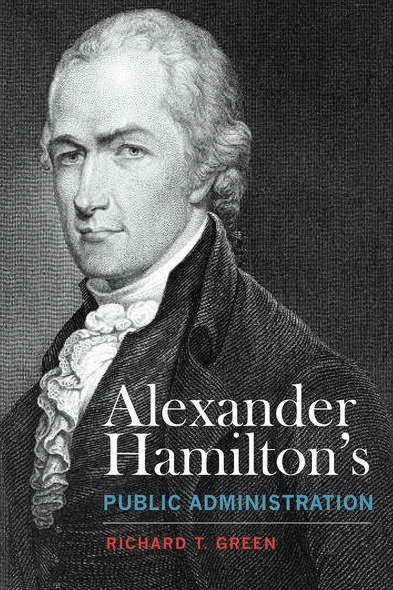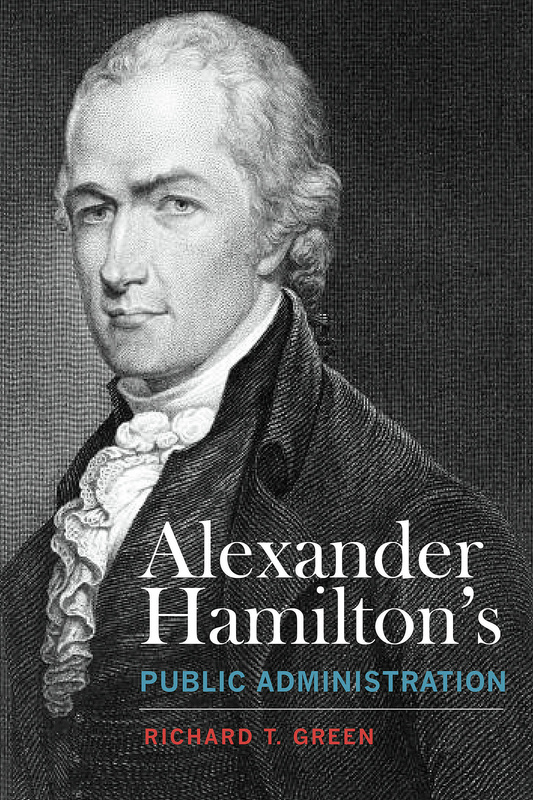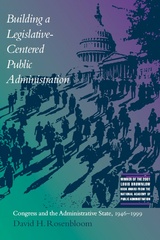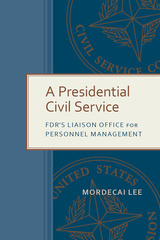
272 pages, 6 x 9
Paperback
Release Date:14 Dec 2021
ISBN:9780817360320
Hardcover
Release Date:09 Apr 2019
ISBN:9780817320164
Examines how Hamilton’s thoughts and experiences about public administration theory and practice have shaped the nation
American public administration inherited from Alexander Hamilton a distinct republican framework through which we derive many of our modern governing standards and practices. His administrative theory flowed from his republican vision, prescribing not only the how of administration but also what should be done and why. Administration and policy merged seamlessly in his mind, each conditioning the other. His Anti-Federalist detractors clearly saw this and fought his vision tooth and nail.
That conflict endures to this day because Americans still have not settled on just one vision of the American republic. That is why, Richard Green argues, Hamilton is a pivotal figure in our current reckoning. If we want to more fully understand ourselves and our ways of governing today, we must start by understanding Hamilton, and we cannot do that without exploring his administrative theory and practice in depth.
Alexander Hamilton’s Public Administration considers Hamilton both as a founder of the American republic, steeped in the currents of political philosophy and science of his day, and as its chief administrative theorist and craftsman, deeply involved in establishing the early institutions and policies that would bring his interpretation of the written Constitution to life. Accordingly, this book addresses the complex mix of classical and modern ideas that informed his vision of a modern commercial and administrative republic; the administrative ideas, institutions, and practices that flowed from that vision; and the substantive policies he deemed essential to its realization. Green’s analysis grows out of an immersion in Hamilton’s extant papers, including reports, letters, pamphlets, and essays. Readers will find a comprehensive explanation of his theoretical contributions and a richly detailed account of his ideas and practices in historical context.
American public administration inherited from Alexander Hamilton a distinct republican framework through which we derive many of our modern governing standards and practices. His administrative theory flowed from his republican vision, prescribing not only the how of administration but also what should be done and why. Administration and policy merged seamlessly in his mind, each conditioning the other. His Anti-Federalist detractors clearly saw this and fought his vision tooth and nail.
That conflict endures to this day because Americans still have not settled on just one vision of the American republic. That is why, Richard Green argues, Hamilton is a pivotal figure in our current reckoning. If we want to more fully understand ourselves and our ways of governing today, we must start by understanding Hamilton, and we cannot do that without exploring his administrative theory and practice in depth.
Alexander Hamilton’s Public Administration considers Hamilton both as a founder of the American republic, steeped in the currents of political philosophy and science of his day, and as its chief administrative theorist and craftsman, deeply involved in establishing the early institutions and policies that would bring his interpretation of the written Constitution to life. Accordingly, this book addresses the complex mix of classical and modern ideas that informed his vision of a modern commercial and administrative republic; the administrative ideas, institutions, and practices that flowed from that vision; and the substantive policies he deemed essential to its realization. Green’s analysis grows out of an immersion in Hamilton’s extant papers, including reports, letters, pamphlets, and essays. Readers will find a comprehensive explanation of his theoretical contributions and a richly detailed account of his ideas and practices in historical context.
Green has created an excellent, comprehensive review of Hamilton’s personal life, including his childhood, education, military experiences, foreign affairs interactions, commerce knowledge, numerous publications, and input to the formation of the United States Constitution. This book would be an excellent resource for anyone interested in government.’
—CHOICE
‘With impeccable research and analysis, Professor Green cogently and convincingly shows why Alexander Hamilton was not only a brilliant public administration theorist and philosopher of the U.S. Founding period, but remains one for us today as well. Green's outstanding contribution to the Constitutional School of American Public Administration is a must read for all serious students and scholars of contemporary public administration, and especially those seeking a stronger understanding of the U.S. presidency, separation of powers and federalism.’
—David Rosenbloom, Distinguished Professor of Public Administration and editor in chief, Routledge Public Administration and Public Policy Series, American University
‘This book is a fine contribution to an important and rich intellectual tradition in American public administration, the melding of theoretical and historical perspectives on administration identified with Leonard White, Herbert Storing, Lynton Caldwell, and John Rohr, among others.’
—Peri E. Arnold, author of Remaking the Presidency: Roosevelt, Taft, and Wilson, 1901–1916 and Making the Managerial Presidency: Comprehensive Reorganization Planning, 1905–1996
Green’s book on Hamilton is a tour de force and a ‘must read’ for both those who defend the rise of the administrative state and those who malign its ‘deep state’ overreach. This book does for partisans on both sides of the current political divide what the play Hamilton did for minorities: ‘It makes Hamilton our own’. It does this by showing how Hamilton’s genius as a lawyer, politician, administrator, and political theorist gave birth to unique doctrines of governance that make it possible for factious politics to be rendered productive through the principles of ‘centripetal leadership’, liberal jurisprudence, and enabling doctrines that support the effective administration of a system of governance by a cadre of public servants who care more about the constitutional system of limited government than personal, party or professional loyalty.’
—Douglas Morgan, professor emeritus, Public Administration at Portland State University
‘Alexander Hamilton’s Public Administration is an important and original book which has the potential to contribute significantly to the way in which we think and talk about the relationship between public administration and the Constitution. It combines a deep historical knowledge of Hamilton’s ideas and practices with insightful and interesting observations about public policy and administration.’
—Michael W. Spicer, author of The Founders, the Constitution, and Public Administration: A Conflict in World Views and In Defense of Politics in Public Administration: A Value Pluralist Perspective
‘Green has given us the definitive synthesis of Hamilton’s vision, ideas, and practices for governing the American commercial republic. This book will stimulate further scholarship, and debate, for years to come.’
—Brian J. Cook, professor and chair of the Center for Public Administration and Policy, Virginia Tech, and editor of Administration and Society journal
Green has produced an insightful and provocative account—which we might describe as an administrative-intellectual biography—of the intricate and multivariate role of public administration in Hamilton’s political thought. . . . Strikingly, Green also manages to explain the larger intellectual tradition that influenced Hamilton, interspersing his analysis of Hamilton with references to major political and economic thinkers, from Locke to Smith, and from Hume to Aristotle. His work will be of interest not only to public administration scholars but also to students of American Political Thought, constitutional law, and the presidency. Green has undertaken the enormous task of engaging with one of America’s political giants and has ably displayed his mastery of Hamilton’s thought. This is no mean accomplishment.’
—American Review of Public Administration
Richard T. Green is professor of political science and public administration at University of Utah. He is the coauthor of Foundations of Public Service.
Contents
Acknowledgments
Introduction
Chapter 1. Hamilton’s Constitutional Republic
Chapter 2. The Energetic Executive in Constitutional Context
Chapter 3. Administrative Jurisprudence
Chapter 4. Administrative Responsibility
Chapter 5. Public Finance and Political Economy: Building Confidence and Public Trust
Chapter 6. Military and Foreign Affairs for the Republic
Conclusion: The Hamiltonian Legacy
List of Abbreviations
Notes
Bibliography
Index







